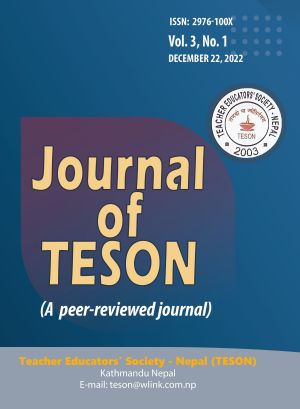Curricular Goals and 21st-century Competency in Mathematics Education in Master’s Degree Program
DOI:
https://doi.org/10.3126/jteson.v3i1.51766Keywords:
Mathematics Education, 21st century competency, Knowledge society, global marketAbstract
The rapidly changing innovation in information and communication technology (ICT), digitalization and globalization has created unprecedented challenges and opportunities for education and educating practices globally. The higher education institutions now need to reform their curricula and the educating practices to promote employability skills to open door for every graduate to engage in the globally networked employment platform. With this background, this study focused on analyzing the professional courses of Mathematics Education at master level in reference to behavioral objectives and directed activities by curriculum. Among the professional courses, this qualitative document-based study is based on the purposively selected two courses; Math Ed 515 and Math Ed 535, as they largely represent the curricular goals of Mathematics Education. The data were analyzed based on theoretical understanding and conceptual framework. This study found, based on objectives and instructional activities, that the course Math Ed 515 focused on knowledge transmission rather than development of 21st century competencies. However, another course Math Ed 535 focused more on skill development along with knowledge transmission. These findings imply that courses in Mathematics Education program at the Master level at the selected university require reforms towards incorporating the 21st century competencies to enable the graduates to compete in the global marketplace.




